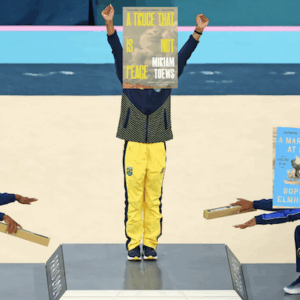
Finding Empathy in the Face of Hate
Gabrielle Bellot Grapples with Deep American Divisions and Fascism Ascendent
In November of 1909, a chilling science-fiction tale by E.M. Forster appeared in The Oxford and Cambridge Review. The story, which was called “The Machine Stops,” was a radical departure from Forster’s previous major work, A Room with a View, and it seemed radical to readers of the day. In it, all of humanity—or so it seems—lives in a kind of vast network called The Machine, with individual humans living in their own rooms, communicating with other humans primarily only through talking to them over a screen. In this world—which eerily echoes the development of instant messaging—the protagonist, Vashti, has lost almost all of her empathy; she, like most of the humans around her, finds it unnerving to even imagine speaking to another human in person.
Forster’s story, of course, is an extreme view of what we would call the Internet Age, but I find myself thinking of it a lot in the aftermath to this agonizing election. And it is difficult, much as I try. Empathy is a simple word, yet it denotes complexity; after all, a capacity for consciousness, and, in turn, the ability to put oneself into another’s shoes, are the markers by which we often define the psychological complexity of the most intelligent animals other than human beings. And literature allows us to do this in a special way, letting us see into the minds of other people, and, as a result, allowing us to see even the figures who may differ most from us as people rather than as angels or demons, as caricatures. Empathy does not necessarily have fixed limits; we can grow to understand people we thought we could not understand before, growing ourselves as our empathy does, and we can learn to understand people without accepting what they may believe in or without normalizing things that are truly monstrous.
You learn a lot about people by seeing what they call monsters—and what they do not.
But when we are pushed to our limits, as I was during this election and have been ever since, empathy becomes difficult. I’ve tried. And I still want to. As much as I know that there are groups that despise people like me—non-white, a woman, queer in multiple ways—I want to fight without resorting to hatred. When we allow ourselves to fight through pure hatred, we allow ourselves to become authoritarian; authoritarianism and hatred are the same side of the coin. And when we fight through hatred, we begin to lose nuance, which means we begin to lose our grasp of reality, for reality is nuanced. But we also give up our empathy when we choose to ignore other’s pain—which is what I have seen time and time again this election, when members of the white nationalist “alt-right” and Bernie-or-Bust alike said infinite variations of the same thing: “I can’t wait to watch America burn when Trump wins.” The former said it to troll people, deciding to make jokes rather than showing any consideration for which of us might very well face the flames of a dangerous administration; the other said it out of furious indignation after the betrayal of the DNC. But both revealed authoritarianism in its most subtle form: a lack of empathy reflected in a desire to have those who disagree suffer under tyranny. Authoritarianism is more common on the right, given the fact that conservatism, broadly, concerns itself with stability, liberalism with an embrace of the potential for change, but authoritarianism can infect the minds of those of us on the left who perhaps initially meant well—and this helps none of us.
I’m struggling. Since the weekend of the election, I’ve been trying to write this, but the words are harder and harder to find. How do I find compassion for the people who raise their hands in Nazi salutes to white-supremacist anti-Semite Richard Spencer, who said that white people are the “creators” of the world and that whites do not need minorities, but we need them? How do I find compassion for Steve Bannon? For Mike Pence? For the endless parade of people who say that people like me are less than they are, for the people who tell us that we must be lying if we point out the bigotry we’ve been facing all along?
“The world had been sad since Tuesday,” reads the first paragraph in Gabriel Garcia Marquez’s “A Very Old Man with Enormous Wings.” It has, for many of us. And just as Marquez’s story centers around how the inhabitants of the sorrowful seaside town view the old man who falls into the muddy, crab-strewn yard of Pelayo and Elisenda—an angel, a devil, a charlatan, a freak—the same seems true here. What do we do with our monsters when they land in our yard? And what do we do when one calls it a monster, but another does not?
*
For many of Trump’s supporters, the President-Elect seems a kind of shadow Obama: a symbol of change. Ask Trump supporters, and this is perhaps the most common consensus: we want change, they will say. And Trump, of course, did not emerge ex nihilo. One of the larger factors leading up to a nomination like Trump also underlies Brexit: an ever-increasing backlash against “multiculturalism,” “immigrants,” and, more specifically, against Muslims, as the largest connecting factor is a radical fear of, and often hatred towards, Muslims, an attitude that is widespread enough to appeal to not only people on the right but on the left, as well as independents. But there are many other reasons, and some people voted on one of them while genuinely being, or claiming to be, ignorant of the others: economic anxieties, racism, xenophobia, sexism, a belief that racism or sexism do not “really” exist anymore and that the left is stirring up racial and gender divisions, the refusal of the left to pay attention to Sanders, the DNC’s corruption, the Clintons’ baggage, the backlash against the left due to its increasingly common caricature as the party of “safe spaces and trigger warnings.”
Change, they say. Yet it is difficult not to see the other symbolism of Trump’s victory: the replacement of not only the first African-American but the most pro-LGBT president with a man who questioned for years whether or not Obama was an American citizen and who, it seems increasingly likely, may roll back the social advances we have made as LGBT citizens and who, for years, has claimed that climate change is a Chinese hoax and who brags about grabbing women’s vaginas without their consent and who has said we should kill not only the members of ISIS but their families.
Authoritarianism and a lack of empathy often go together; it is easy to give people absolute rules to live by when we do not see them as individuals, but rather as a kind of homogeneous blur. Ruler of Hiroona, one of the great, underrated novels of Caribbean literature is also a novel of authoritarianism, chronicling the comical and at-times disquieting rise to power of a politician in a small fictional Caribbean nation, likely modeled after St. Vincent, the home of its author, G. C. H. Thomas. The protagonist of the novel goes to fanatical lengths to secure his position as prime minister, from arson to obeah. A small island, perhaps, is the best template for a fanatical, authoritarian ruler: the smaller the nation, the easier to imagine you rule over it all, its every potholed road, its every slumberous village, its every wharf surrounded by sea urchins, its every field of coconut trees. You are the absolute ruler; this is your nation. A bigger nation becomes a bigger small island. And if the reality of the nation you rule over doesn’t meet your fancy, you can artificially try to change it, as the extraordinary dictator of Gabriel Garcia Marquez’s Faulknerian novel of an authoritarian regime, The Autumn of the Patriarch, does.
This was an election in which the line between reality and rumor often seemed to disappear; I am reminded of Shirley Jackson’s masterful late novel, We Have Always Lived in the Castle, in which the lurid folktales of a New-England village about the unfortunate Blackwood family becomes indistinguishable from the reality of the family, leaving even the surviving Blackwoods in a state of occasional wonder about what is true and what is folkloric. This was an election in which fake news stories contributed in perhaps more materially a way to election results than ever before in this country.
For Orwell in “Politics and the English Language,” words could lose their meaning if we used them too loosely; if “you don’t know what Fascism is,” he writes, “how can you struggle against Fascism? One need not swallow such absurdities as this, but one ought to recognize that the present political chaos is connected with the decay of language.” And it goes deeper. If you only define “racism” as its most overt examples—someone being lynched, perhaps—you will assume that casual racism is not “racism”—and thus deny that racism is a present-day issue, a misreading that stems from a too-broad, non-nuanced redefinition of a word. The same, of course, is true for fascism.
Trump, obviously, is not Mussolini or Hitler, the figures he is most readily casually compared to—but there is a reason these comparisons get made even by people who are educated about these historical figures, which is that fascism is not solely its obvious external effects; we can talk about what may become fascism by reading the right signs. Yet many potential or actual voters turn their minds off the moment the word “fascist” appears connected to Trump. It is much like the way that a religious fanatic who staunchly believes their holy text is inerrant will turn off their mind the moment you present a contradiction in the text that suggests it does contain an error. We live in an era where many people read headlines and not what follows them, and, even if they do read what follows, many of them will simply attack the publication rather than the argument the piece makes, or they will skim a piece and respond with what they assume the piece does not say, even when it actually does.
We are divided, yes. But this election did not make us divided. It showed the divisions that were already there, whether we want to admit it or not.
*
I believe in compassion and love. Not a naïve ceremony of holding hands and singing songs, but of trying to genuinely find common ground even with those of us we feel are the most different from who we are. There is a section of Trump supporters—specifically, the ones who explicitly endorse white nationalism, anti-Semitism, anti-Muslim bigotry, anti-LGBTQ bigotry, and extreme misogyny—I do not imagine I can actually do this with because our worlds are so utterly different. I do not live under such delusions. Yet I would rather extend a hand to the void and hope someone takes it, even for a moment, than write off all of the people who voted one way as a homogeneous group. This election has layers, has many reasons why someone voted one way or the other. And it is possible to find unexpected alliances. We must join together wherever we can. Being conservative or liberal should not be the end of how we see each other; it is understandable why great political differences can make relationships difficult, but it is very possible to find common ground with people who, on the surface, seem our opposites. And it’s necessary to do so if we wish to truly make this country great. We fail as people—and even more as writers—when we move too quickly to turn those who differ from us into the Other; isn’t literature, and art in a broader sense, the room that allows us a better view onto the world beneath and above us, the room with its closets that shows us the shoes others walk in, the room with a view towards making us better by making us understand others not as the Other but simply as different?
I still have dreams because all is not lost, not yet. I have a dream that one day this nation will have had not only a black man as its president but a woman—and even, fanciful as it seems, that that woman could be trans. Imagine the America we would have then, where a young trans girl could actually believe she could lead a nation. I have another dream, silly as it may seem, that we could have someone who is openly a Muslim lead this nation—or even the group Americans say they trust least in polls, an open atheist. And I even have a dream that we can learn to love each other, so that we finally stop seeing the signs that show we do not: that this race need not apply, that this gender is not welcome, that this person’s gender is not real enough for you. I have many dreams, in truth, and someone dreamt a few of these before me. I almost don’t want to wake up from this one—but to be woke, to be aware, you must learn to turn dream into non-dream. The machine stops—and we keep moving.
Isn’t that the most beautiful kind of dream, the one you realize you never needed to wake from?
If we wish to survive, we must do two things: wake up from the false dream, if you let yourself sleep, that Trump’s administration is not devastatingly dangerous; and come together, regardless of party affiliation, regardless of who and what we are, come together, as those of us who are not blind and who are human enough to care, to fight this. Because if we do come together, we may not be able, even then, to undo all the damage this administration has wrought, but we may be able to prevent another such administration from coming into power. We can resist.
You learn a lot from what people turn into monsters, as well as from their dreams. You learn, too, from what they say they wish to change. But you learn the most of all, perhaps, from how they act when the thing they see as a monster truly appears.
Gabrielle Bellot
Gabrielle Bellot is a staff writer for Literary Hub. Her work has appeared in The New York Times, The Atlantic, The New York Review of Books, The New Yorker, The Paris Review Daily, The Cut, Tin House, The Guardian, Guernica, The Normal School, The Poetry Foundation, Lambda Literary, and many other places. She is working on her first collection of essays and a novel.



















